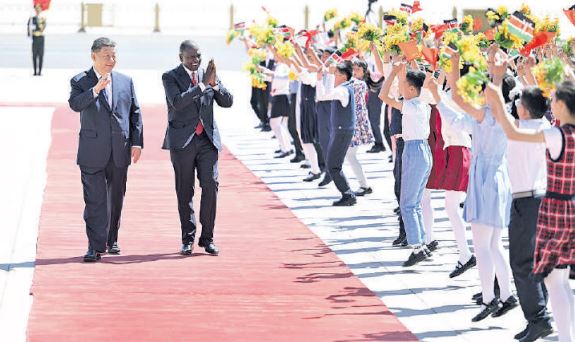
In a world characterised by shifting geopolitical dynamics and economic uncertainties, the enduring relationship between China and Kenya stands as a beacon of dependable, forward- looking and mutually beneficial international cooperation. The recent state visit by President William Ruto to China, at the invitation of President Xi Jinping, has reaffirmed the strategic depth and aspirational future of the Sino-Kenya partnership — an inspiring example of all- weather cooperation for the Global South and the broader international community.
Since the establishment of diplomatic ties 62 years ago, China and Kenya have cultivated a partnership grounded in mutual respect, non-interference and a shared commitment to development. What distinguishes this bilateral relationship is its multi-dimensionality: from infrastructure and trade to education, healthcare, digital innovation and people-to-people exchanges. The visit in April this year brought this broad-spectrum cooperation into sharper focus, with both leaders pledging to deepen strategic engagement across new and existing domains.
At the heart of this partnership is a shared vision for modernisation and sustainable development. Through alignment with Kenya’s Bottom-up Economic Transformation Agenda and Vision 2030, China’s Belt and Road Initiative has supported transformative projects such as the Mombasa-Nairobi standard gauge railway and now, the line will be extended to Malaba. Beyond physical infrastructure, the two countries are now driving the integrated development of industry and infrastructure, nurturing industrial capacity, enhancing trade facilitation and boosting regional connectivity. The agreement to explore a free trade framework, coupled with China’s support for Kenya’s export growth and financial infrastructure, speaks to a maturing economic relationship that is becoming more balanced and inclusive.
Sino-Kenya relations are not merely transactional; they are emblematic of a principled approach to South-South cooperation. Kenya’s reaffirmation of the One China policy and its stance on issues relating to national sovereignty and internal affairs underscores a political solidarity built on respect for each other’s core interests. This foundation of mutual political trust is critical at a time when unilateralism and protectionism threaten the multilateral order.
Moreover, both countries have embraced visionary global frameworks such as the Global Development Initiative, the Global Security Initiative and the Global Civilisation Initiative, which resonate strongly with the needs and aspirations of developing countries. Through these frameworks, China and Kenya have committed to tackling shared challenges — poverty, food insecurity, climate change and digital inequality — while respecting diversity, promoting peace and advancing global equity.
The health and well-being of citizens have also emerged as important focal points. China’s support for local healthcare manufacturing in Kenya and facilitation of access to Chinese medicines highlight a people-centred approach to cooperation. Likewise, educational collaboration — through scholarships, Confucius Institutes and vocational training — continues to empower youth and bridge knowledge gaps.
Perhaps most significantly, the relationship is rooted in shared values and a common vision for global governance. As representatives of the Global South, both countries champion an international order based on fairness, inclusivity and mutual respect. Their call for reform of the United Nations, including the expansion of African representation on the Security Council, reflects a just demand to correct historical imbalances and give developing countries a stronger voice.
On security, Kenya’s support for the GSI and China’s recognition of Kenya’s role in regional peace efforts, particularly in the Horn of Africa, illustrate a collaborative approach to maintaining stability. The commitment to combat transnational crimes through enhanced law enforcement cooperation underscores the functional depth of this alliance.
Cultural and civilisational exchanges further enrich this relationship. Initiatives such as the China-Kenya culture and tourism season and planned activities under the Year of China-Africa People-to-People Exchanges highlight the soft power dimension of diplomacy. These engagements help to humanise foreign policy, fostering deeper understanding between citizens and strengthening the sociocultural foundation of bilateral ties.
Critics may point to concerns over debt, sovereignty, or geopolitical competition, but such narratives often overlook the agency of African nations and the nuanced nature of these partnerships. Kenya, like many African states, is engaging with China based on clearly defined national interests and development priorities. The pragmatic, transparent and increasingly diversified nature of Sino-Kenya cooperation serves as evidence of a relationship built not on dependency, but on mutual empowerment.
In conclusion, China and Kenya have laid out a compelling vision for the future — one that not only benefits their respective peoples but also contributes meaningfully to the broader international community. In an era where uncertainty is the norm, the steadfast and evolving China-Kenya relationship demonstrates the power of solidarity, strategic alignment and shared aspirations. As the two nations work together to build a community with a shared future, they offer a model of all-weather cooperation worth emulating across continents.



















